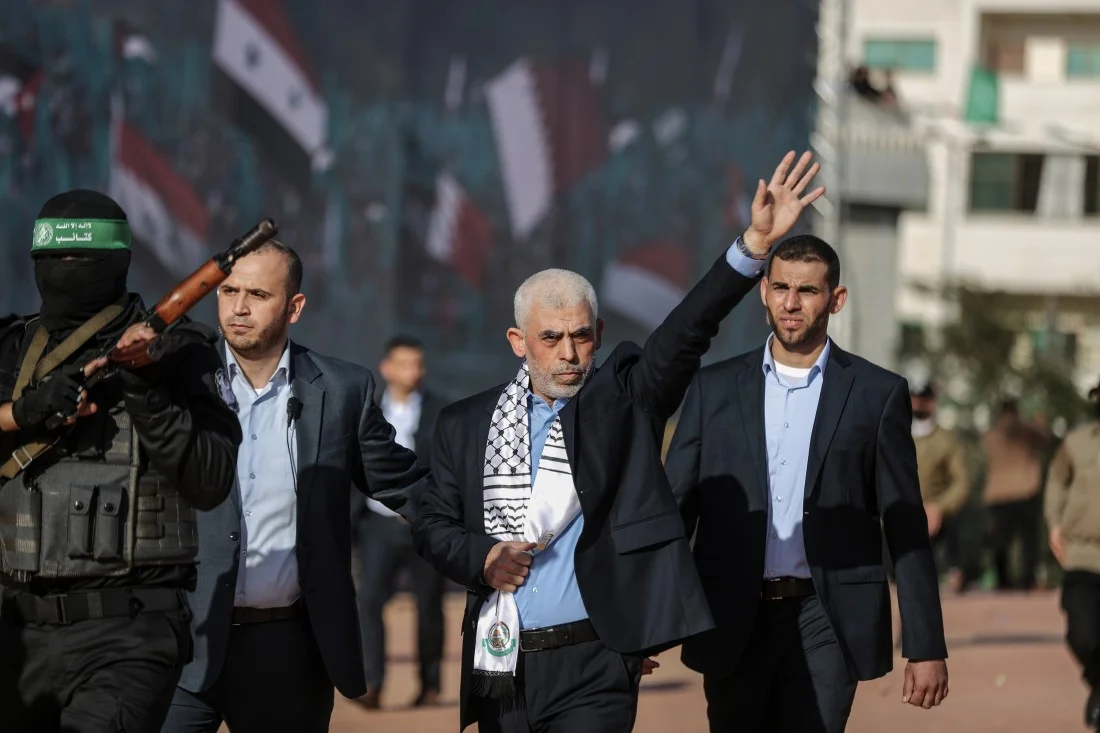10 May 2018 – Originally published at ynetnews.com
Over the course of 5 days, La Repubblica reporter Francesca Borri met and spoke to Hamas’s leader in the Gaza Strip, Yahya Sinwar:
I know next to nothing about you. You are said to be quite private, a man of few words. You rarely speak with journalists. And actually, this is your first time you’re speaking with Western media. But you have been leading Hamas for more than a year. Why did you choose to speak now?
“Because now I see a real opportunity for change.”
An opportunity? Now?
“Now. Yes.”
To be honest, what looks most likely here is rather a new war. I was in Gaza last June, and it was just as usual: flying bullets, tear gas, wounded everywhere. And then airstrikes, rockets, more airstrikes. A golden opportunity to get shot. Since April, since the start of this latest wave of protests, you’ve had nearly 200 dead.
“While on the other side, there was only one dead. And so, first of all, I would say that ‘war’ is quite a misleading word: it’s not that there is a war at some point, and on the other days we have peace instead. We are always under occupation, it’s a daily aggression. It’s just of varying intensity. But anyway, the truth is that a new war is in no one’s interest. For sure, it’s not in ours. Who would like to face a nuclear power with slingshots? But if we can’t win—for Netanyahu a victory would be even worse than a defeat, because it would be the fourth war. It can’t end as the third one, which already ended as the second one, which already ended as the first one. They should take over Gaza. And they are trying their best to get rid of the Palestinians of the West Bank and keep a Jewish majority. I don’t think they want an additional two million Arabs. No. War achieves nothing.”
It sounds a bit odd, coming from someone from Hamas’s military wing.
“I am not the leader of a militia, I’m from Hamas. And that’s it. I am the Gaza leader of Hamas, of something much more complex than a militia—a national liberation movement. And my main duty is to act in the interest of my people: to defend it and its right to freedom and independence. You are a war correspondent. Do you like war?”
Not at all.
“And so why should I? Whoever knows what war is, doesn’t like war.”
But you have been fighting for all your life.
“And I am not saying I won’t fight anymore, indeed. I am saying that I don’t want war anymore. I want the end of the siege. You walk to the beach at sunset, and you see all these teenagers on the shore chatting and wondering what the world looks like across the sea. What life looks like. It’s breaking. And should break everybody. I want them free.”
Borders have been basically sealed-off for 11 years. Gaza doesn’t even have water anymore, only sea water. How is living here?
“What do you think? 55 percent of the population is under 15. We are not speaking of terrorists, we are speaking of kids. They have no political affiliation. They have just fear. I want them free.”
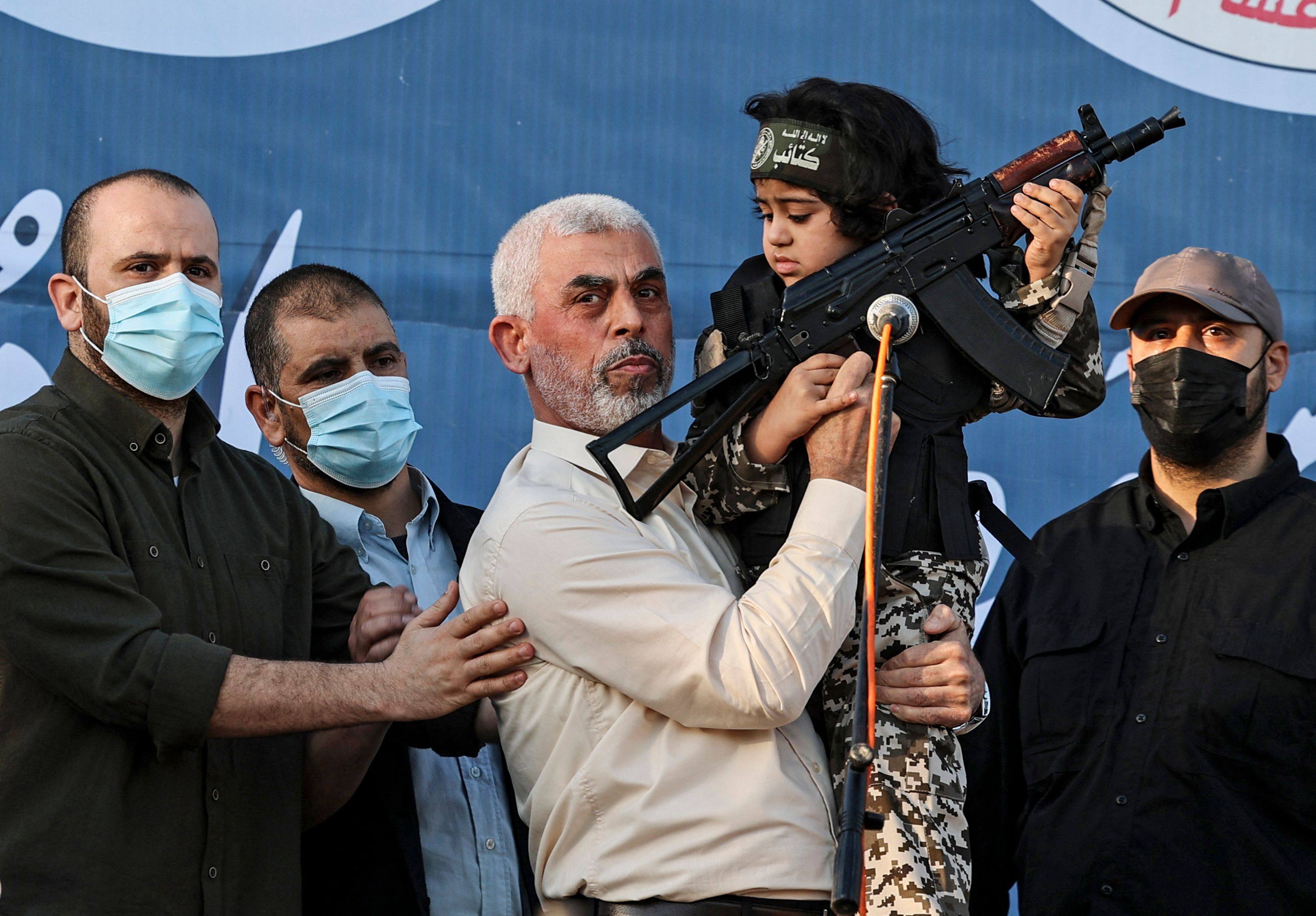
80 percent of the population depends on aid. And 50 percent is food insecure—50 percent is hungry. According to the UN, Gaza will soon be unfit to live in. Yet still in recent years Hamas has found resources to dig its tunnels.
“And luckily. Otherwise we would all be dead. The way you see it, it’s the way the Zionist propaganda tells it. The siege didn’t come after the tunnels; it wasn’t a reaction to tunnels. It’s the other way round. There was a siege and a humanitarian crisis, and to survive we had no other option than digging tunnels. There were times when even milk was banned.”
You know what I mean. Don’t you think you bear some responsibility?
“Responsibility is on the besieger, not on the besieged. My responsibility is to work with whoever can help us to end this deadly and unjust siege, and I am thinking especially on the international community. Because Gaza can’t go on like this, the situation here is unsustainable. And in this way, an explosion (escalation) is unavoidable.”
So why you don’t buy milk, rather than guns?
“If we hadn’t bought (guns), we wouldn’t be alive by now. We’ve bought it, don’t worry. We’ve bought milk, and much else: food, medicine. We are 2 million. Do you have any idea what does it mean to get food and medicine for 2 million people? Tunnels are used only minimally for resistance—and because otherwise you may not die of hunger, but you would die of airstrikes. And Hamas pays for resistance out of its own pocket, not with public funds. Out of its own pocket.”
So Hamas has been doing well in government.
“What do you think, that being in power in Gaza is like being in power in Paris? We have been in power for years in many municipalities, exactly because of our reputation for efficiency and transparency. Then in 2006 we won the general elections, and we were blacklisted. There is no electricity, it’s true, and this affects everything else. But do you think that we have no engineers? That we are unable to build a turbine? Of course we do. But how? With sand? You can have the best surgeon in town, but you are pretending he can operate with fork and knife. Look at your skin, it’s already peeling away. Here if you arrive from outside, if you arrive from the world, you get sick straight away. What should grab your eye is that we are still alive.”
And so, Hamas is now apparently thinking of a ceasefire. Negotiators are working around the clock. What do you mean by “ceasefire”?
“I mean a ceasefire. Quiet. The end of the siege.”
Quiet for quiet.
“No, wait. Quiet for quiet, and the end of the siege. A siege is not quiet.”
And quiet… For how long?
“That’s not the main issue, honestly. What really matters is rather what happens on the ground in the meantime. Because if the ceasefire means that we don’t get bombed, but still we have no water, no electricity, nothing, then we are still under siege—it makes no sense. Because the siege is a type of war, it’s just war through other means. And it’s also a crime under international law. There’s no ceasefire under siege. But if we see Gaza returning to normalcy … if we see not only aid, but investments, development—because we are not beggars, we want to work, study, travel, like all of you, we want to live, and to stand on our own—if we start to see a difference, we can go on. And Hamas will do its best. But there is no security, no stability, neither here nor in the region, without freedom and justice. I don’t want the peace of the graveyard.”
OK, but maybe it’s just a trick to reorganize yourself. And in six months, you’d go back to war. Why should the Israelis trust you?
“First of all, I never went to war—war came to me. And my question, in all truth, is the opposite. Why should I trust them? They left Gaza in 2005, and they simply reshaped the occupation. They were inside, now they block borders. Who knows what’s really going on in their minds? And yet, that’s what trust is all about. And perhaps that’s our mistake. We always think in terms of ‘Who’s gonna do the first step, you or me?’”
OK, but… Again. Should the ceasefire not work…
“But for once, can we imagine instead what happens if it works? Because it might be a powerful motivation for doing our best to make it work, no? If for a moment we imagined Gaza as it actually was, not a long time ago—have you ever seen some photos of the 1950s? When in the summer we had tourists from everywhere?”
And Gaza had plenty of cafés, shops, palm trees. I’ve seen those photos. Yes.
“But today as well… Have you seen how brilliant our youth is? Despite it all. How talented, how inventive and dynamic they are? With old fax machines and old computers, a group of twenty-somethings assembled a 3D printer to produce the medical equipment that is barred from entry. That’s Gaza. We are not only destitution and barefoot children. We can be like Singapore, like Dubai. And let’s make time work for us. Heal our wounds. I have been in jail for 25 years. He lost a son—killed in a raid. Your translator—he lost two brothers. The man who served us tea—his wife died from an infection. No big deal, a cut. But there were no antibiotics, and that’s how she died. For something any pharmacist could treat. Do you think it’s easy for us? But let’s start with this ceasefire. Let’s give our kids the life we never had. And they will be better than us. With a different life, they will build a different future.”
Are you giving up?
“We’ve been struggling all our life to get a normal life. A life free from occupation and aggression. We are not surrendering, we are persisting.
And during this ceasefire, Hamas would keep its weapons? Or you would accept international protection, like the blue helmets? Like Srebrenica? My guess is you won’t.
“You guess right.”
Sorry if I keep at it, but should this ceasefire not work? Not to jinx it, but you know, the past is not really encouraging. So far, hardliners have knocked out any deal attempt.
“So far. First of all, you seem to be quite confident, but there is no agreement yet. We are ready to sign it, Hamas and nearly all the Palestinian groups are ready to sign it and comply with it. But for now, there is only the occupation. Having said that, if we will be attacked, that’s obvious, we will defend ourselves. As always. And we will have a new war. But then, in a year, you will be here again. And again I will be here to say: war achieves nothing.”
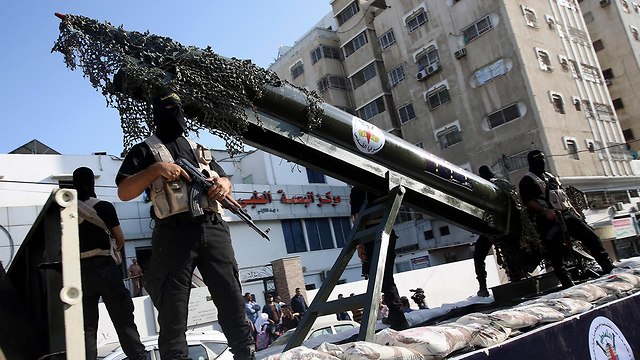
You have an iconic weapon: rockets. Quite makeshift rockets, actually, which are usually stopped by the Iron Dome, and to which Israel replies with its much more powerful missiles. Thousands Palestinians have been killed. Have the rockets been useful?
“Let’s be clear: having an armed resistance is our right, under international law. But we don’t only have rockets. We have been using a variety of means of resistance. Always. Such a question, honestly, is more for you than for me—for all you journalists. We make the headlines only with blood. And not only here. No blood, no news. But the problem is not our resistance, it is their occupation. With no occupation, we wouldn’t have rockets. We wouldn’t have stones, Molotov cocktails, nothing. We would all have a normal life.”
But do you think they have fulfilled their purpose?
“Certainly not. Otherwise we wouldn’t be here. But so, what about the occupation? What was its purpose? Raising killers? Have you watched the video where a soldier shoots at us as if we were bowling pins? And he laughs, laughs. They (the Jewish people) were people like Freud, Einstein, Kafka. Experts of maths and philosophy. Now they are experts of drones, of extrajudicial executions.”
You now have a new iconic weapon: arson kites. They are driving Israel crazy, because they elude the Iron Dome, nor can they be shot down one by one.
“Kites are not a weapon. At most, they set on fire some stubble. An extinguisher, and it’s over. They are not a weapon, they are a message. Because they are just twine and paper and an oil-soaked rug, while each battery of the Iron Dome costs $100 million. Those kites say: you are immensely more powerful. But you will never win. Really. Never.”
West Bank Palestinians face the same occupation, and yet they opted for quite a different strategy: appealing to the UN, to the international community.
“And that’s crucial. All is crucial, all means of resistance. But, if I may say so, sorry: when it comes to Palestine, the international community is rather part of the problem. When we won the elections—and we won free and fair elections—the reaction was a blockade. Immediately. We’ve proposed a government with Fatah, and not just once but a hundred times, and nothing. The only reply has been the blockade. If it turned out the way it did, it is also your fault (of the international community). Now as well. You warn Hamas: We’ll deal with you only if there is Fatah. Then you warn Fatah: We’ll deal with you only if there isn’t Hamas. The rift we have been so criticized for is also an effect of the blockade. Of your pressures that are sometimes nothing less than threats. With a national unity government, Ramallah would not get a penny anymore. It would go bankrupt.”
The blockade is in place because Hamas is viewed as an anti-systemic movement, an uncostitutional movement so to say. That doesn’t abide to the rules of the game.
“Which game? The occupation?”
You know… Oslo. The two-state solution.
“But Oslo is over. I think that’s the only point everyone agrees upon here. But really everyone. It’s been simply an excuse to distract the world with endless negotiations, and in the meantime build settlements everywhere and physically erase any feasibility of a Palestinian state. 25 years have come and gone, and what did we get? Nothing. But most of all, why do you always insist on Oslo? Why do you never speak of what happened later? Like the National Unity Document, for instance, which was based on the well-known 2006 Prisoners’ Document. And that outlines our current strategy, I mean, Hamas, Fatah, all of us, all together—a state within 1967 borders, with Jerusalem as its capital. And with the right of return for refugees, of course. 12 years have come and gone, and you keep on asking: Why don’t you accept the 1967 borders? I’ve got the feeling that the problem is not on our side.”
The international community spends million dollars on the Palestinians.
“Spends. Exactly. It simply spends. Wrongly. You honored the Oslo Accords with a Nobel Peace Prize, and you vanished. Nobody monitored their implementation. The key question is: Was it the right strategy (for the Palestinians) to help establish their own state and all its institutions? And among other things, I have to remind you that the fourth Geneva Convention is clear: the cost of the occupation is to be on the shoulders of the occupier. It’s not your job to build roads and schools, and above all to rebuild what gets demolished. Otherwise, instead of opposing the occupation, you make it easier.”
The staunchest opponent of this ceasefire seems to be not Israel—which is now focused on Iran—but Fatah, which fears it might be a Hamas success.
“A success? This ceasefire is not for Hamas or Fatah: it is for Gaza. For me, what matters is that you finally realize that Hamas is here. That it exists. That there is no future without Hamas, there is no possible deal whatsoever, because we are part and parcel of this society, even if we lose the next elections. But we are a piece of Palestine. More than that, we are a piece of the history of the entire Arab world, which includes Islamists as well as seculars, nationalists, leftists. But with that said, please let’s avoid the word ‘success.’ Because it’s outrageous for all the terminally ill patients that right now are on the border waiting for it to open. For all the fathers that tonight won’t dare to look at their kids, because they won’t have any meal (to provide them). What success we are talking about?”
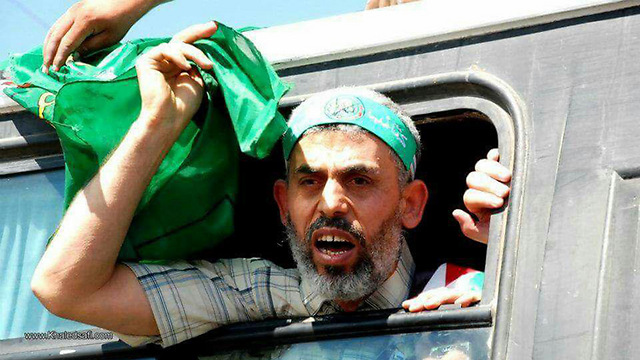
You went in jail when you were 27. And when you got out, you were 50. How was readjusting to life? To the world?
“When I entered, it was 1988. The Cold War was still going on. And here, the Intifada. To spread the latest news, we printed fliers. I came out, and I found the internet. But to be honest, I never came out—I have only changed prisons. And despite it all, the old one was much better than this one. I had water, electricity. I had so many books. Gaza is much tougher.”
What have you learned from prison?
“A lot. Prison builds you. Especially if you are Palestinian, because you live amid checkpoints, walls, restrictions of all kinds. Only in prison do you finally meet other Palestinians, and you have time for talking. (You’re) thinking about yourself, too. About what you believe in, the price you are willing to pay. But it’s like if now I ask you: what have you learned from war? You would say: A lot. You would say: War builds you. But for sure you would like not to have ever been in war. I have learned a lot, yes. But I don’t wish prison on anybody. But really anybody. Not even those who today—across that barbed wire—knock us down like bowling pins and laugh, and don’t realize that they might end up in 25 years at the Hague.
In the International Criminal Court.
“Of course. Because again: there’s no future without justice. And we’ll seek justice.”
But you know that some Palestinians might also end up at the Hague.
“Under international law, we have all the right to resist the occupation. But the court is the court, of course. And it will work on whatever it will have to work on. And yet, its role is essential. And not only to stop crimes—it’s essential to punish criminals. Its role is essential for the victims as well, because only a trial allows a reconstruction of what happened, and in this way, its processing, somehow. When it comes to grief, no third party can replace victims. No political deal whatsoever can overcome their loss and move on. That’s up to the victims.”
You were released in the Gilad Shalit swap. And Hamas currently has two Israelis, plus the remains of two soldiers killed during the last war. In a ceasefire deal, I guess a prisoner swap would be an essential clause for you.
“More than essential—a must. It isn’t a political issue, for me it is a moral issue. Because your readers probably believe that if you are in jail, you are a terrorist, or somehow an outlaw. A car thief. No. We all get arrested, sooner or later. But literally—all of us. Take a look at Military Order 101. Without army authorization, it’s a crime even to wave a flag, or be more than ten (people) in a room for tea, chatting about politics. Perhaps you are just chatting about Trump, but you can be sentenced to up to 10 years. Somehow, it’s a rite of passage. It’s our coming of age. Because if there is something we are united by, something that really makes us all equal—all Palestinians—it’s prison. And for me it is a moral obligation: I will try more than my best to free those who are still inside.”
In some way, you achieved more through kidnappings than through rockets.
“Which kidnappings?”
Like Gilad Shalit’s.
“Gilad Shalit wasn’t a hostage, he was a war prisoner. You see why we rarely speak with journalists? A soldier gets killed, and you publish a photo of him on the beach, and your readers think we shot him in Tel Aviv. No. That guy wasn’t killed while wearing Bermuda shorts and carrying a surfboard, but while wearing a uniform and carrying an M16, and firing on us.”
And with the ceasefire?
“With the ceasefire no one will fire on us, right? And so no one will be captured.”
You were talking of prison, of coming of age. Hamas has turned 30, how did you change?
“How did you see all this, 30 years ago?”
Thirty years ago I was 8.
“And that’s it: we changed as you changed. As everybody changed. It was 1988, and as I told you, we still had the Cold War. And the world was much more ideological than today. Much more black and white, friends and enemies. And our world, too, was a bit like that. Then, over time, you learn that you can find friends, and enemies, where you wouldn’t expect.”
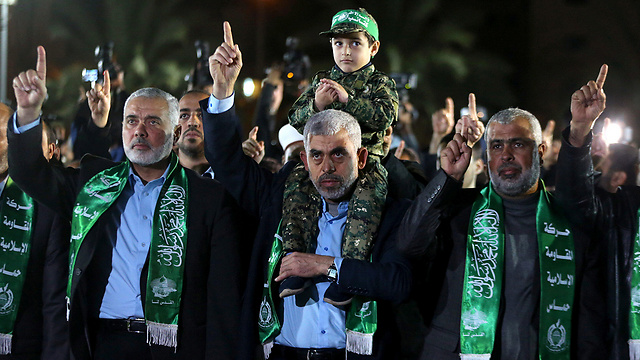
The Hamas Charter is still quite black and white.
“That’s our first document. And perhaps… the last one matters more. Why do you ask me of a Charter from 30 years ago, and not of all that had followed it, which shows our evolution? Dozens and dozens of documents, it’s all there: our relationship with civil society and with other political groups, the regional context, the international context, and the occupation, of course. The answer to all your questions is there. And truthfully, we expected you to get the signal and start a dialogue with Hamas. Because, again, we are not a transitory phenomenon. There is no future without Hamas. And yet you keep on asking of something from 30 years ago. And so, as for Oslo, I’ve got the feeling that the problem is not on our side.”
Who is the problem?
“All of those who still view us as an armed group, and nothing more. You don’t have any idea of what Hamas really looks like. Just a glimpse: half of our employees are women. Would you have ever guessed that? You focus on resistance, on the means rather than the goal—which is a state based on democracy, pluralism, cooperation. A state that protects rights and freedom, where differences are faced through words, not through guns. Hamas is much more than its military operations. It’s in our DNA. We are first and foremost a social movement, not just a political movement. We set up soup kitchens, schools, hospitals. Since ever. Because to do your part, you don’t need to be minister of welfare. If you are Hamas, you are a citizen before you are a voter.”
Yet when most of my readers think of Hamas, they don’t think of charities. They rather think of the second intifada and suicide attacks. To Israelis, you are a terrorist.
“And that’s what they are for me—in light of their crimes against us.”
A perfect start for a ceasefire.
“And what should I say? We hit civilians? They hit civilians. They suffered? We suffered. Tell me about any of their dead, and I will tell you of one of our dead. Of ten of our dead. And so? That’s why you are here? You are here to talk of the dead, or to avoid new casualties? But most of all, you. Do you think you are innocent, only because you are Italian—neither Arab nor Jewish? How easy it is for you to come from far away and feel wise and fair. We all have blood on our hands. You too. Where were you during these 11 years of siege? And during these 50 years of occupation? Where were you?”
What kind of life do you hope for your children?
“A life as Palestinians, of course. Head high. Always. Despite it all, I hope they will be strong, and keep on struggling till the day they get freedom and independence. Because I want my kids to dream of becoming doctors not to treat only the wounded, but cancer patients. Like all of the kids of the world. I want them to be safely Palestinians, so that they can be much more than Palestinians.”
I forgot to ask you about the “deal of the century,” Donald Trump’s peace plan. Even though it’s not very clear what it is all about, there’s nothing on paper.
“It’s actually a very clear obliteration of our prospect of freedom and independence. There’s no sovereignty, no Jerusalem. No right of return… There is only one thing: our (refusal). And that’s not only Hamas’s position. That’s something we all agree about. No.”
And so for now you will go on with protests, with the demonstrations that you started in April. Every Friday along the fence. You’ve been seen there quite often.
“And I’ll tell you two names only: Ibrahim Abu Thuraja and Fadi Abu Salah. They were both 29, and they were both in a wheelchair. Just two of the many amputees of the last wars. And that’s when you realize that here you don’t get killed because you are a danger—because what danger are you, on a wheelchair, for an army that is across a barbed wire, hundreds of meters away from you? No. Here you don’t get killed for what you do, but for what you are. You get killed because you are Palestinian. You don’t stand a chance.”
If you were to sum up everything you said in one sentence only. What’s the message you would like readers to remember the most?
“It’s time for change. It’s time to end this siege. End this occupation.”
And do you think you will be believed?
“You were here in June, together with hundreds of other journalists, and your coverage was the toughest one on us. And you are also translated into Hebrew. And yet you are here, again, because you deeply respect us, and we deeply respect you. Sometimes, somehow, the messenger is also the message. You will leave now, and write it all. Will you be read? Will you be listened to? I don’t know. But we have done our part.”
You seem to be quite confident.
“I’m just realistic. It’s time for change.”

